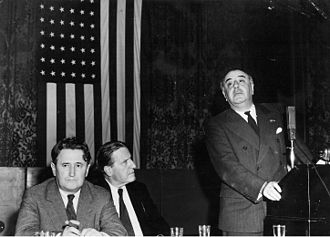Henry Torrès (17 October 1891 – 4 January 1966) was a French trial lawyer and politician, and a prolific writer on political and legal matters.
Henri Torrès | |
|---|---|
 | |
| Member of the Chamber of Deputies for Alpes-Maritimes | |
| In office 1 May 1932 – 31 May 1936 | |
| Personal details | |
| Born | 17 October 1891 Les Andelys, Normandy, France |
| Died | 4 January 1966 (aged 74) Paris, France |
| Political party | PCF |
| Spouse | Jeanne Blum |

Family
editHenry Torrès was born in Les Andelys in 1891 to a Jewish family.[1] His grandfather, Isaiah Levaillant, founded the League for the Defense of Human and Civil Rights during the Dreyfus Affair. He married Jeanne Levylier, with whom he had two children Jean and Georges, but they divorced.[2]
Career
editAs a young man, Torrès became an active Communist and worked as a journalist for various socialist publications. During the First World War, he served as an infantry sergeant, was injured at Verdun and won several medals including the Croix de Guerre. After the war Torrès decided to study law and became a criminal lawyer. With Vincent de Moro-Giafferi and César Campinchi he was known as one of the "three Musketeers"—all brilliant young leaders of the Paris bar. In his early years Torrès had aspired to become a comedian, but his style was encumbered by a pronounced lisp. Nonetheless, in his later years he was famed for his booming voice and flamboyant personality.
Torrès was involved in several criminal trials, before the Schwartzbard trial, not only in Paris but in Moscow and in Rumania. Upon returning to Paris he initiated a protest campaign denouncing the barbaric treatment of Jews in Bessarabia. After the Schwartzbard trial he was recognized as one of France's leading trial lawyers[3] and remained active in political affairs.[4]
After the Nazi invasion of France, Torrès fled to South America, but was expelled first from Uruguay and then from Brazil because of his leftist associations. He moved on to Canada and then the United States. While in America, he campaigned against the Vichy regime and supported Charles de Gaulle. As a Jew, he had been banned from the French bar and because of his anti-government pamphlets and books he was condemned to death by the Pétain regime.[5]
Writer
editIn New York City, Torrès served as editor-in-chief of La Voix de France, a political journal for refugees and later as a professor of law at the Universities of Rio de Janeiro and São Paulo.[6] After the war, he returned to his homeland and was reinstated into the French bar.
From 1948 to 1958 he was a Gaullist senator for the Seine department. He served briefly as Vice President of the High Court of Justice and did work in the national radio and television system, serving as President of the state monopoly from 1948 to 1959.
Torrès was a prolific writer and also wrote plays with a legal background including French translations of The Trial of Mary Dugan and Witness for the Prosecution. Henry Torrès died at his Paris home in 1966. He was 75.
References
edit- ^ "Henry Torres Dies in France; Was Defender in Historic Jewish Cases | Jewish Telegraphic Agency". jta.org. Retrieved 2016-08-01.
- ^ "Milestones, May 28, 1945". Time. 1945-05-28. ISSN 0040-781X. Retrieved 2022-12-15.
- ^ Joffrin, Laurent. "Livre. Lorsque le gouvernement de Vichy promulgue les lois sur le statut des Juifs, les avocats ne protestent pas. Pis, ils les appliquent avec zèle à leur profession. Ce jour de 1940 où les avocats ont failli. Robert Badinter, «Un antisémitisme ordinaire. Vichy et les avocats juifs. 1940-1944», Fayard, 260 pp., 110 F." Libération (in French). Retrieved 2022-12-15.
- ^ Czerny, Boris (2001). "Paroles et silences. L'affaire Schwartzbard et la presse juive parisienne (1926-1927)". Archives Juives (in French). 34 (2): 57. doi:10.3917/aj.342.0057. ISSN 0003-9837.
- ^ "Lazareff Scornful of Vichy Act". Jewish Telegraphic Agency. Retrieved 2022-12-15.
- ^ "TorrèS, Henry | Encyclopedia.com". www.encyclopedia.com. Retrieved 2022-12-15.
This section is empty. You can help by adding to it. (July 2010) |
Further reading
edit- Jean-Denis Bredin, The Affair: The Case of Alfred Dreyfus (1986)
- Eric Cahm, The Dreyfus Affair in French Society and Politics (1996)
- Guy Chapman, The Dreyfus Trials (1972)
- Nicholas Halasz, Captain Dreyfus: The Story of a Mass Hysteria (1955)
- Michael Burns, France and the Dreyfus Affair: A Documentary History (1999)
- David Levering Lewis, Prisoners of Honor, the Dreyfus Affair (1994), Henry Holt and Co, ISBN 0-8050-3766-7
- The Hon Justice Michael Kirby AC CMG, The Dreyfus Case a Century On - Ten Lessons for Ireland & Australia (PDF)